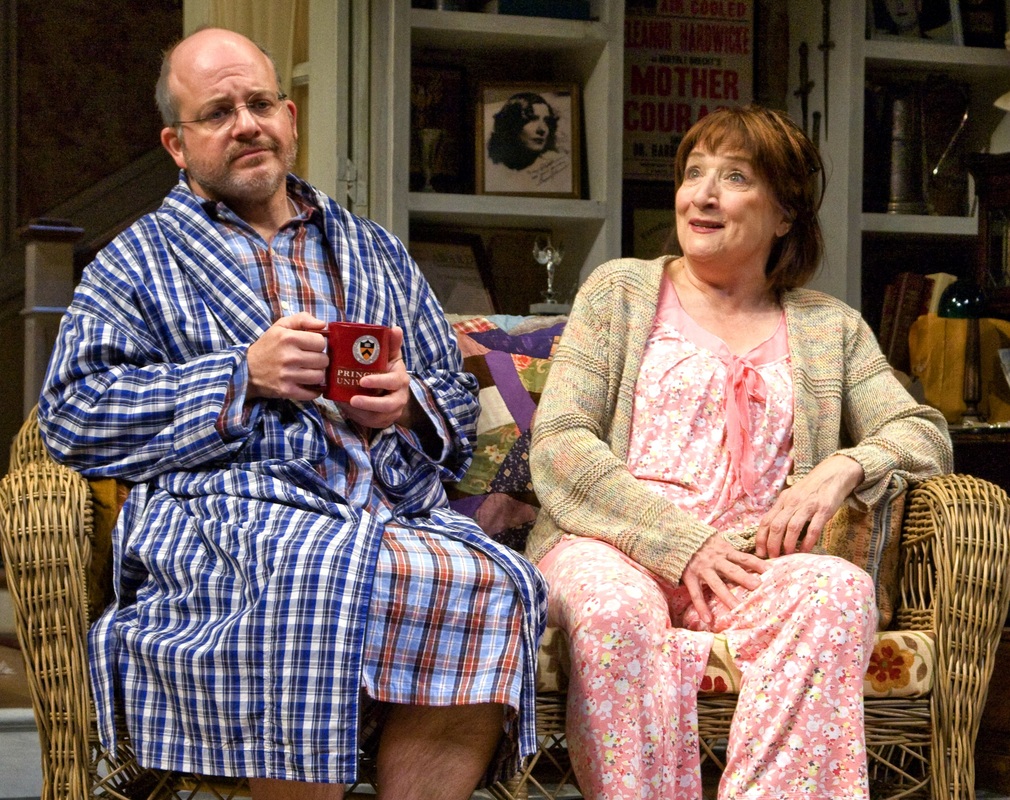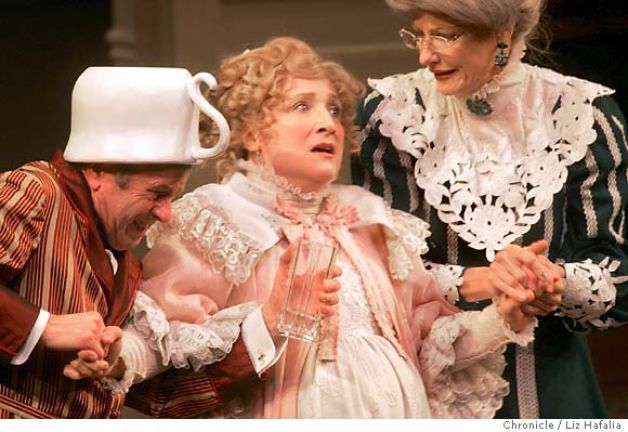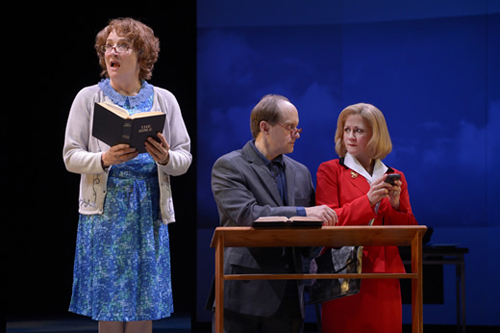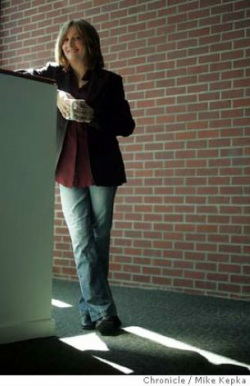Sharon Lockwood
Note: This is not the format of our typical Story on this website. But while we are waiting for Sharon's "official" Story, we decided to reprint this recently-published article about her incredible acting career.
 1965
1965
Longtime local comedic favorite Geoff Hoyle adapted two "conjugal farces" by Georges Feydeau and made "For Better or Worse," now playing at Berkeley Repertory Theatre. In the original one-act plays, 1911's "Leonie's Early" and 1910's "Purging the Baby," written late in Feydeau's career, the fin de siecle French farceur loosed his considerable arsenal of wit full force upon the institution of marriage, portraying it as a battleground -- and one on which a poor, well-meaning husband can't possibly win against his spouse's formidable caprice.
That meant that whoever played the wife in the resultant two-act play would have to be able to more than hold her own against Hoyle, who translated, adapted and stars in the piece.
But Hoyle had already met his match, and he and director David Ira Goldstein (artistic director of Arizona Theatre Company) agreed it had to be Berkeley actress Sharon Lockwood, whose sense of comic timing was honed to pinpoint precision during her 25 years in the San Francisco Mime Troupe.
"She's completely rock-solid all the time, and she never wavers," Hoyle says. "If you drop a line, she'll always scoop it up, because she's been an ensemble player for so long. Plus she's also really funny."
That she is. In the first act, Lockwood staggers around the stage hugely pregnant and in a seemingly permanent distemper. The tantrum she throws when her husband refuses to put a chamber pot on his head for her amusement is nicely undermined by a sly smile as soon as his view of her is obstructed.
In the second part, the push and pull of her alternating shrewishness and pleading tenderness has Hoyle's Bastien writhing in frustration. It's a delicate balance between harridan and humanity, and Lockwood nails it, every inch the doting mother as she frets about 7-year-old Baby's potty troubles.
That last part comes naturally: Lockwood says one of the main reasons she finally left the Mime Troupe in 1995 was because being on the road all the time became much harder once her daughter (with fellow ex-Trouper Arthur Holden) was in school.
For years after her departure from the company, reviews of Mime Troupe shows would invoke the type of parts Sharon Lockwood used to play, and even occasionally speculate what it would take to bring her back.
"Oh boy, that didn't make me too popular there, probably," says Lockwood, who confesses it was an adjustment for her as well. "It is strange to go to a show and not know many of the people, because that was so much of my life."
Now that Rose Lockwood-Holden (also an actress, seen at Berkeley Rep in Tony Kushner's "Slavs!" in 1996) has headed off to New York University, Lockwood's spending more time out of town again, reprising her 1994 Berkeley Rep role in Stephen Wadsworth's production of "The Triumph of Love" in Seattle, New Haven and Kansas City, Mo., in 2003. This world premiere co-production of "For Better or Worse" premiered at Arizona Theatre Company in January before moving to Berkeley Rep in March.
That meant that whoever played the wife in the resultant two-act play would have to be able to more than hold her own against Hoyle, who translated, adapted and stars in the piece.
But Hoyle had already met his match, and he and director David Ira Goldstein (artistic director of Arizona Theatre Company) agreed it had to be Berkeley actress Sharon Lockwood, whose sense of comic timing was honed to pinpoint precision during her 25 years in the San Francisco Mime Troupe.
"She's completely rock-solid all the time, and she never wavers," Hoyle says. "If you drop a line, she'll always scoop it up, because she's been an ensemble player for so long. Plus she's also really funny."
That she is. In the first act, Lockwood staggers around the stage hugely pregnant and in a seemingly permanent distemper. The tantrum she throws when her husband refuses to put a chamber pot on his head for her amusement is nicely undermined by a sly smile as soon as his view of her is obstructed.
In the second part, the push and pull of her alternating shrewishness and pleading tenderness has Hoyle's Bastien writhing in frustration. It's a delicate balance between harridan and humanity, and Lockwood nails it, every inch the doting mother as she frets about 7-year-old Baby's potty troubles.
That last part comes naturally: Lockwood says one of the main reasons she finally left the Mime Troupe in 1995 was because being on the road all the time became much harder once her daughter (with fellow ex-Trouper Arthur Holden) was in school.
For years after her departure from the company, reviews of Mime Troupe shows would invoke the type of parts Sharon Lockwood used to play, and even occasionally speculate what it would take to bring her back.
"Oh boy, that didn't make me too popular there, probably," says Lockwood, who confesses it was an adjustment for her as well. "It is strange to go to a show and not know many of the people, because that was so much of my life."
Now that Rose Lockwood-Holden (also an actress, seen at Berkeley Rep in Tony Kushner's "Slavs!" in 1996) has headed off to New York University, Lockwood's spending more time out of town again, reprising her 1994 Berkeley Rep role in Stephen Wadsworth's production of "The Triumph of Love" in Seattle, New Haven and Kansas City, Mo., in 2003. This world premiere co-production of "For Better or Worse" premiered at Arizona Theatre Company in January before moving to Berkeley Rep in March.

Lockwood and Hoyle have a long history of collaboration at the Rep, beginning with the commedia dell'arte classic, "Servant of Two Masters" in 1986. Both became fixtures of the Berkeley Rep stage, where they faced off again and again, in Hoyle's creations "The Convict's Return" in 1992 and "Geni(us)" in 1995, and two by Ben Jonson by way of veteran Mime Troupe playwright Joan Holden, "Volpone" in '92 and 2000's "The Alchemist" -- in which she played the title role, never mind that Subtle was a male role.
"It was a great bit of casting that Tony Taccone did," Hoyle recalls, " 'cause she had done so many guys working in the Mime Troupe. I mean, she'd played Teddy Roosevelt."
Their onstage familiarity really pays off in playing a squabbling married couple, Hoyle notes. "I'd like to think that people say, 'Oh, those two guys are at it again.' "
Farce is familiar territory for Lockwood. Though she hasn't done Feydeau before, she sees similarities between his biting wit and that of contemporary Italian satirist Dario Fo, whose work she knows well, having been in the first professional U.S. staging of a Fo play, the Mime Troupe's 1979 production of "We Can't Pay, We Won't Pay" at the Victoria Theatre.
But Lockwood says she also relishes the opportunity to sink her teeth into dramatic roles these days, and her work at the Rep has shown dazzling range, from Oscar Wilde's "The Importance of Being Earnest" to David Edgar's "Pentecost," Aeschylus' "Oresteia" to Kushner's "Hydriotaphia." She originated the lead role in Joan Holden's stage adaptation ofBarbara Ehrenreich's book "Nickel and Dimed" at Seattle's Intiman Theatre in 2002, which played at TheatreWorks and Brava the next year.
Before Lockwood ran away to join the Mime Troupe, she says, "I started out in school doing stuff like 'The Glass Menagerie' and 'Laura.' I was the tragic actress."
But once she got swept away by the political theater of the Vietnam era, she found the new niche that would earn her so much acclaim in the decades to come -- the first time as tragedy, the second time as farce.
"I'm not a loudmouth person," she says. "People think of me as this comic actress, and for a long time I didn't get the chance to do other kinds of things, because people saw me in a certain light."
"It was a great bit of casting that Tony Taccone did," Hoyle recalls, " 'cause she had done so many guys working in the Mime Troupe. I mean, she'd played Teddy Roosevelt."
Their onstage familiarity really pays off in playing a squabbling married couple, Hoyle notes. "I'd like to think that people say, 'Oh, those two guys are at it again.' "
Farce is familiar territory for Lockwood. Though she hasn't done Feydeau before, she sees similarities between his biting wit and that of contemporary Italian satirist Dario Fo, whose work she knows well, having been in the first professional U.S. staging of a Fo play, the Mime Troupe's 1979 production of "We Can't Pay, We Won't Pay" at the Victoria Theatre.
But Lockwood says she also relishes the opportunity to sink her teeth into dramatic roles these days, and her work at the Rep has shown dazzling range, from Oscar Wilde's "The Importance of Being Earnest" to David Edgar's "Pentecost," Aeschylus' "Oresteia" to Kushner's "Hydriotaphia." She originated the lead role in Joan Holden's stage adaptation ofBarbara Ehrenreich's book "Nickel and Dimed" at Seattle's Intiman Theatre in 2002, which played at TheatreWorks and Brava the next year.
Before Lockwood ran away to join the Mime Troupe, she says, "I started out in school doing stuff like 'The Glass Menagerie' and 'Laura.' I was the tragic actress."
But once she got swept away by the political theater of the Vietnam era, she found the new niche that would earn her so much acclaim in the decades to come -- the first time as tragedy, the second time as farce.
"I'm not a loudmouth person," she says. "People think of me as this comic actress, and for a long time I didn't get the chance to do other kinds of things, because people saw me in a certain light."




